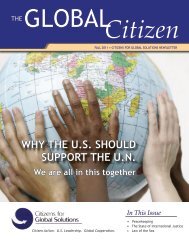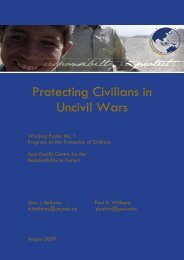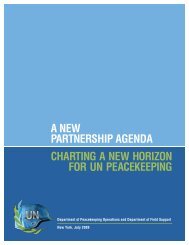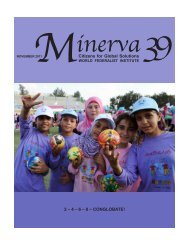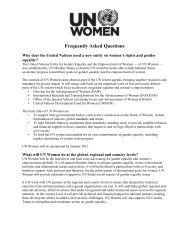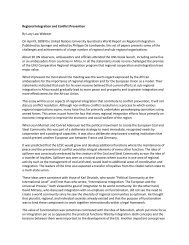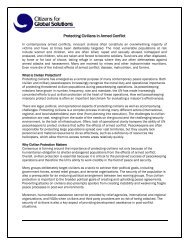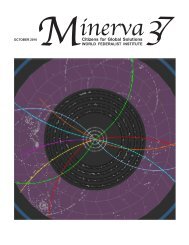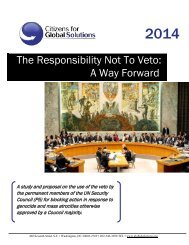Minerva, Spring 2008 (Volume 32) - Citizens for Global Solutions
Minerva, Spring 2008 (Volume 32) - Citizens for Global Solutions
Minerva, Spring 2008 (Volume 32) - Citizens for Global Solutions
You also want an ePaper? Increase the reach of your titles
YUMPU automatically turns print PDFs into web optimized ePapers that Google loves.
of the world, it is unthinkable that we can<br />
have peace without a real governmental<br />
organization to create and en<strong>for</strong>ce law on<br />
individuals in their international relations.<br />
Without such an over-all solution to give<br />
up-to-date expression to the democratic<br />
sovereignty of the peoples, all attempts to<br />
avoid specific dangers in the international<br />
field seem to me illusory” (p. 197).<br />
The book also contains several statements<br />
that suggest that world federalist<br />
ideas are having some influence in unexpected<br />
places. For example, Talbott notes<br />
that in the first edition of his 1948 classic<br />
Politics Among Nations prominent<br />
realist political theorist Hans Morgenthau<br />
observed that “the argument of the advocates<br />
of the world state is unanswerable.<br />
There can be no permanent international<br />
peace without a state coextensive with<br />
the confines of the political world [and]<br />
a radical trans<strong>for</strong>mation of the existing<br />
international society of sovereign nations<br />
into a supranational community of individuals”<br />
(p. 198). In 1992 Ronald Reagan<br />
said that he could <strong>for</strong>esee “a standing UN<br />
<strong>for</strong>ce — an army of conscience — that<br />
is fully equipped and prepared to carve<br />
out human sanctuaries through <strong>for</strong>ce if<br />
necessary” (p. 258). In his 2006 farewell<br />
address at the Truman Library and<br />
Museum in Independence, Missouri, UN<br />
Secretary-General Kofi Annan said, “The<br />
United States has given the world an example<br />
of a democracy in which everyone,<br />
including the most powerful, is subject<br />
to legal restraint. Its current moment of<br />
world supremacy gives it a priceless opportunity<br />
to entrench the same principles<br />
at the global level” (p. 391).<br />
Talbott provides interesting inside accounts<br />
of crucial events and international<br />
meetings during the years of the Clinton<br />
administration as well as an insightful<br />
analysis of the actions and views of individuals<br />
in the current Bush administration.<br />
His last chapter, “The Crucial Years,” focuses<br />
on the upcoming U.S. Presidential<br />
election and the policies Talbott believes<br />
the United States should adopt as well as<br />
the issues that must be addressed. “The<br />
next administration should . . . waste no<br />
time in demonstrating that respect <strong>for</strong> international<br />
law is once again part of the<br />
bedrock of U.S. <strong>for</strong>eign policy” (p. 393).<br />
There should be greater support <strong>for</strong> the<br />
United Nations, but beyond that “the UN<br />
needs to be incorporated into an increasingly<br />
variegated network of structures<br />
and arrangements — some functional in<br />
focus, others geographic; some intergovernmental,<br />
others based on systematic<br />
collaboration with the private sector, civil<br />
society, and NGOs” (p. 394). The United<br />
States should “encourage regional organizations<br />
to develop their own capacities<br />
as well as habits of cooperation with one<br />
another and with the UN itself” (p. 395).<br />
Also “ensuring a peaceful twenty-first<br />
century will depend in large measure on<br />
narrowing the divide between those who<br />
feel like winners and those who feel like<br />
losers in the process of globalization” (p.<br />
395).<br />
With regard to the most urgent problems<br />
to be tackled, Talbott points to “two clear<br />
and present dangers. One is a new wave<br />
of nuclear-weapons proliferation; the other<br />
is a tipping point in the process of climate<br />
change. These mega-threats can be<br />
held at bay in the crucial years immediately<br />
ahead only through multilateralism<br />
on a scale far beyond anything the world<br />
has achieved to date” (p. 395). Talbott<br />
concludes with this comment: “By solving<br />
[these] two problems that are truly<br />
urgent, we can increase the chances that<br />
eventually . . . the world will be able to<br />
ameliorate or even solve other problems<br />
that are merely very important. Whether<br />
future generations make the most of such<br />
a world, and whether they think of it as a<br />
global nation or just as a well-governed<br />
international community, is up to them.<br />
Whether they have the choice is up to<br />
us” (p. 401). It seems to this reviewer<br />
that Talbott strays from his own basic insights<br />
when he suggests that the nuclear<br />
proliferation problem might be resolved<br />
by multilateralism on a grand scale in the<br />
absence of a prior revolutionary change<br />
to the global nation system (that is, to a<br />
world federation) which would substantially<br />
restrict national sovereignty.<br />
54 • <strong>Minerva</strong> #<strong>32</strong> • June <strong>2008</strong><br />
Eva B. Olds<br />
5 November 1922 – 5 April <strong>2008</strong><br />
This issue is respectfully dedicated<br />
to the memory of Eva B. Olds, a<br />
friend of <strong>Minerva</strong>, whose life was<br />
devoted to pioneering multiple roles<br />
<strong>for</strong> women. “My mother comes from<br />
the Pleiades – all sparkle,” writes her<br />
daughter, Professor Linda Olds.<br />
Notes<br />
&<br />
Resources<br />
HUMAN SECURITY:<br />
STUDENT ATTITUDES<br />
In its early phases, Paul Evans’ University<br />
of British Columbia web-based<br />
course, “Human Security in the Emerging<br />
International System”, gathered more<br />
than 25 definitions of human security in<br />
many different languages, ranging “from<br />
those that are comprehensive and holistic<br />
to those that are narrow and focused. Using<br />
such a continuum, Lloyd Axworthy’s<br />
focus on humanitarian interventionism<br />
is considered biased towards the narrow<br />
side, while those interested in both<br />
conflict and development are considered<br />
broad.” As early as 2001, Evans reported<br />
(at a Harvard JFK School of Government<br />
workshop on “Measurement of Human<br />
Security”) “an interesting ‘generational<br />
gap’ appearing — students instinctively<br />
lean towards the comprehensive approach<br />
and are unbothered by challenges to traditional<br />
notions of sovereignty”.<br />
~<br />
GLOBAL HUMAN SECURITY<br />
REPORT<br />
At the same conference in 2001, Andrew<br />
Mack announced that he would shift from<br />
Harvard to the University of British Co-



